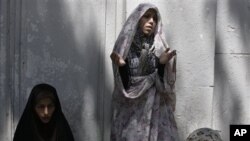The Iranian summer, with its stepped up patrols by morality police seeking to ensure that Iranian women are dressed modestly, is drawing to a close; but not so the attempts in Iran to control the lives of female Iranians.
Thirty six of the country’s universities have announced new restrictions that bar women from 77 academic fields. English literature, nuclear physics, electrical and industrial engineering, business management, and chemistry are among the subjects now off limits to women at the graduate level.
Seyed Abolfazl Hassani, Director General for the Spread of Education at the Ministry of Science, Research and Technology, reportedly said that ”Some fields are not very suitable for women’s nature.”
This move is taking place in a country which has the highest proportion of female to male undergraduates in the world. More than 60 percent of Iran’s university students are women. Yet it is also a country where gender discrimination is legal, particularly in cases dealing with crime, divorce, child custody and inheritance.
Exiled Iranian human rights lawyer and Nobel laureate Shirin Ebadi has asked United Nations Secretary General Ban Ki Moon and Navi Pillay, the High Commissioner for Human Rights to investigate the educational ban. “[It] is part of the recent policy of the Islamic Republic, which tries to return women to the private domain inside the home as it cannot tolerate their passionate presence in the public arena," wrote Ms. Ebadi. "The aim is that women will give up their opposition and demands for their own rights."
Secretary of State Hillary Clinton has said it is the impulse of extremists everywhere to control women – “to strip their rights, curb their participation, limit their ability to make choices for themselves.” But the societies established when these impulses hold sway are unstable and impoverished.
“When women have the chance to participate in the economic and political lives of their communities, not only do their lives improve, but the lives of their families do as well, said Secretary of State Clinton. “Commerce flourishes, instability declines, and you see a general uplifting of societies and nations.”
Iranian women have played a pivotal role in Iranian civil society, educational accomplishment, and the struggle for all Iranians to express their universal human rights. A government that tries to constrain women demonstrates its own insecurity and fear, and does so at the expense of the country’s entire population and prosperity.
Thirty six of the country’s universities have announced new restrictions that bar women from 77 academic fields. English literature, nuclear physics, electrical and industrial engineering, business management, and chemistry are among the subjects now off limits to women at the graduate level.
Seyed Abolfazl Hassani, Director General for the Spread of Education at the Ministry of Science, Research and Technology, reportedly said that ”Some fields are not very suitable for women’s nature.”
This move is taking place in a country which has the highest proportion of female to male undergraduates in the world. More than 60 percent of Iran’s university students are women. Yet it is also a country where gender discrimination is legal, particularly in cases dealing with crime, divorce, child custody and inheritance.
Exiled Iranian human rights lawyer and Nobel laureate Shirin Ebadi has asked United Nations Secretary General Ban Ki Moon and Navi Pillay, the High Commissioner for Human Rights to investigate the educational ban. “[It] is part of the recent policy of the Islamic Republic, which tries to return women to the private domain inside the home as it cannot tolerate their passionate presence in the public arena," wrote Ms. Ebadi. "The aim is that women will give up their opposition and demands for their own rights."
Secretary of State Hillary Clinton has said it is the impulse of extremists everywhere to control women – “to strip their rights, curb their participation, limit their ability to make choices for themselves.” But the societies established when these impulses hold sway are unstable and impoverished.
“When women have the chance to participate in the economic and political lives of their communities, not only do their lives improve, but the lives of their families do as well, said Secretary of State Clinton. “Commerce flourishes, instability declines, and you see a general uplifting of societies and nations.”
Iranian women have played a pivotal role in Iranian civil society, educational accomplishment, and the struggle for all Iranians to express their universal human rights. A government that tries to constrain women demonstrates its own insecurity and fear, and does so at the expense of the country’s entire population and prosperity.




